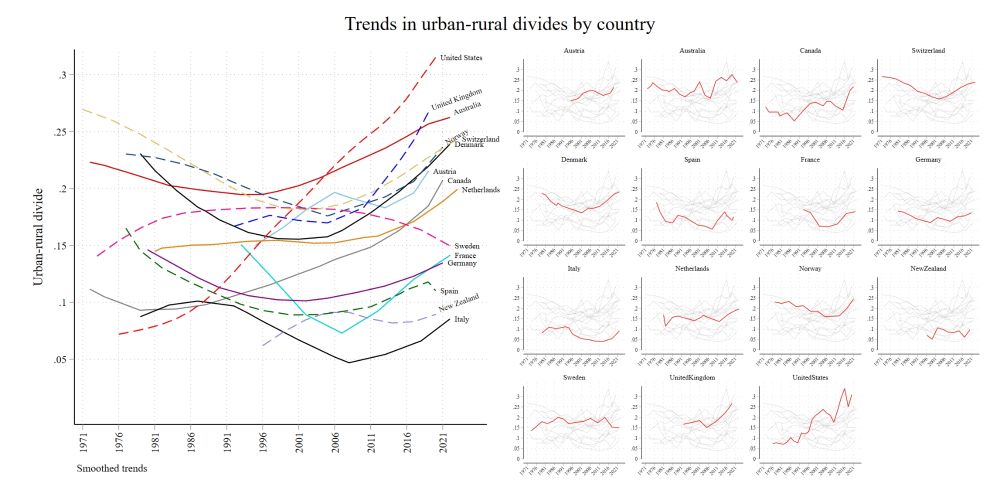We are also learning a lot already from the exciting work done on this topic by among others @ethanbusby.bsky.social, @atsouloumalakoudi.bsky.social, Henry Maes, Gaetano Scaduto, and their colleagues and many others.
10.09.2025 12:06 — 👍 1 🔁 0 💬 0 📌 0
This is part of an ongoing project with @jnareal.bsky.social about political stereotypes. We hope to learn more about how citizens imagine each other in polarized times. We will study this in surveys & using text analysis of (online) political discussion among politicians, citizens and media (🇳🇱&🇧🇷)
10.09.2025 12:06 — 👍 3 🔁 0 💬 1 📌 0
Takeaway: stereotypes aren’t tidy boxes. They’re webs tying together images about what people believe, where they belong, and what they’re like. They flatten the line between elites and supporters, and mix cognition with affect. That matters for how we study them, and for reducing misperceptions.
10.09.2025 12:05 — 👍 1 🔁 0 💬 1 📌 0
Ambiguity 3: many “traits” weren’t neutral descriptions, but expressive and moralizing. Assigning problematic traits is a way to delegitimize opponents in a way that ideas or groups cannot. Often these targeted political style: “fanatical”, “intolerant”. That’s neither fully an idea or personality.
10.09.2025 12:05 — 👍 2 🔁 0 💬 1 📌 0
Ambiguity #2: the categories themselves also blur. An image like “religious” (dominant in Poland) denotes a group, issue, and trait all at once. Traits (like “corrupt”, dominant in Brazil) often imply important political issues. We found the categories often go together seamlessly.
10.09.2025 12:04 — 👍 4 🔁 0 💬 1 📌 0
All of this is simple on paper, but less so in people’s minds.
Ambiguity #1: when asked to describe voters, many talked about politicians. Our mental image of a political camp blends elites and masses into a single picture. We judge voters through the behavior (or scandals) of their leaders.
10.09.2025 12:03 — 👍 4 🔁 0 💬 1 📌 0

Dovetailing with US findings, we find that, across all cases, people associate political camps mainly with issues, alongside traits. Answers were however strongly shaped by context (for instance, emphasizing corruption 🇧🇷, environment/refugees 🇩🇪, dishonesty 🇬🇧, religion/democracy 🇵🇱).
10.09.2025 12:03 — 👍 2 🔁 0 💬 1 📌 0
We looked for three ways people might perceive political groups: by issues or ideas (“against refugees”), by social groups (“young”), or by traits (“stupid”). These reveal different ways of looking at political conflict. Here we borrowed from an influential book by @ethanbusby.bsky.social et al.
10.09.2025 12:02 — 👍 2 🔁 0 💬 1 📌 0
OSF
What do citizens imagine their political opponents to be like? Polarization is real, but it also lives in our heads, fueled by stereotypes. We asked people in 🇧🇷, 🇬🇧, 🇩🇪 & 🇵🇱 to describe opponents in their own words.
With @jnareal.bsky.social, @markuswagner.bsky.social & @piotrmarczynski.bsky.social 👇
10.09.2025 12:02 — 👍 30 🔁 9 💬 1 📌 2
📢 Out now! The Handbook of Affective Polarization is officially published 🎉
📖 Open Access & packed with 30 great chapters thanks to amazing authors. Huge thanks to everyone, and in particular to @marianotorcal.bsky.social for the great (and fun) collaboration! 💙
Link below for the e-book 👇
24.07.2025 14:04 — 👍 42 🔁 19 💬 0 📌 0
De Tweede Kamerverkiezingen komen er aan, en dus ook het Nationaal Kiezersonderzoek (NKO)! 🗳️
Ben je een beginnende onderzoeker (aan het promoveren of max 5 jaar gepromoveerd)? Dan kun je een voorstel indienen om vragen toe te voegen aan het NKO.
💡Help mee kiezersgedrag te begrijpen!
Meer info 👇
17.06.2025 18:10 — 👍 19 🔁 7 💬 2 📌 2

Gentle reminder 📢 Today is the deadline to submit a proposal for the @ecpr.bsky.social GenConf, this year in beautiful Thessaloniki 🇬🇷26-29/8. If you are working on Affective Polarization, consider the section that @eelcoharteveld.bsky.social and I are organising: shorturl.at/O3N2b
06.01.2025 14:01 — 👍 1 🔁 2 💬 0 📌 0
Hi folks! I'd like to start listening to more podcasts, and would love to get some suggestions from polisky & commsky (feel free to also shamelessly self-promote!)
Thanks :)
27.11.2023 14:00 — 👍 1 🔁 2 💬 0 📌 0

In een lopend onderzoek met Jonathan Rodden vergelijk ik stad-platteland verschillen in verkiezingsuitslagen tussen landen. Zojuist TK verkiezingen in NL toegevoegd aan dataset. Een paar dingen vallen op: 1. De verschillen in NL zijn sinds 2012 steeds licht toegenomen en het hoogst in ruim 40 jaar.
28.11.2023 07:37 — 👍 16 🔁 8 💬 1 📌 0
One week left to apply! 🚨 PhD position on polarization in great department and city! @ipz.bsky.social
Start date = negotiable
polisky PSJMinfo
24.10.2023 11:25 — 👍 13 🔁 15 💬 0 📌 2
Interested in how elections and political landscapes are changing? Join us at SPUI25, where @tabouchadi.bsky.social, @macarenaares.bsky.social, @stefaniereher.bsky.social and I will put the upcoming Dutch elections in a comparative perspective. More details here: spui25.nl/programma/wh...
10.10.2023 13:56 — 👍 13 🔁 5 💬 0 📌 1
Professor of political science @SciencePoULB | Cevipol
Parties, elections, participation
PhD Student in Political Science at the University of Gothenburg.
PhD candidate at the University of Amsterdam,
AI, Culture & Society research unit @ ILLC.
Social identity / morality / affective polarisation / computational social science.
PhD candidate in Political Science at the University of Mannheim, soon post-doc at Uni Amsterdam. Affective polarisation, negative partisanship, Brazilian politics. RTs are performative endorsements.
Political Scientist at JGU Mainz, Germany.
Research on public opinion, elections, parties, and democracy (more at: https://www.nilssteiner.com/).
Spokesperson of the AK Wahlen (@dvpw.bsky.social).
Associate editor at @pvs-journal.bsky.social.
PhD Candidate in Political Science | KU Leuven & University of Antwerp @m2p-antwerp.bsky.social | affective polarisation, radical-right voting & democratic support | https://jochemvanagt.github.io
Politicoloog / Political scientist | Avans Hogeschool | @UniLeiden.bsky.social | Faces of Science
PhD Candidate at FU Berlin 📚
Computational Methods 💻, Political Behavior, Disability & Politics📣
🏳️🌈 They/Them
Berlin/Amsterdam
https://vivifabrien.github.io/
PhD at KU Leuven | Intergroup Relations and Religious Tolerance
Postdoc in Sociology at Utrecht University; PhD from @EUI_EU
Polarization | Cleavages | Social Networks | Political Sociology www.jonadejong.com
she/her. postdoc @gesis_org. comparative political scientist that studies political trust, autocracies, and information environments. likes cats and sailboats.
Politòleg. Public opinion, political behavior, polarization. Postdoc at @dec-gr.bsky.social @uab.cat
https://scholar.google.com/citations?user=7-ZIUKIAAAAJ&hl=es&authuser=2
Professor in Political Science
Director of the Research and Expertise Centre in Survey Methodology
Director of the RECSM summer and winter School in Methods
Co-editor de RLOP
Associate Professor of Political Science University of Amsterdam | lobbying | interest groups | agenda-setting | comparative politics
Political scientist researching immigration, inequality, and culture.
🌐 simonecremaschi.com
Political scientist | Co-director British Election Study | Election number crunching for ITV | Trustee McDougall Trust
caprosser.com
Professor of Political Science, Stony Brook University. I study motivations, norms, emotions, and polarization.
Political scientist and Director of the Center on American Politics at IU Bloomington.
PhD Candidate | University of Amsterdam | PolSci | Political Trust | Religion & Politics | he/him 🍉
https://criticaltrust.eu/
Postdoctoral researcher | Sociology and Political Science | University of Amsterdam |
Geographic political divides | Political trust


